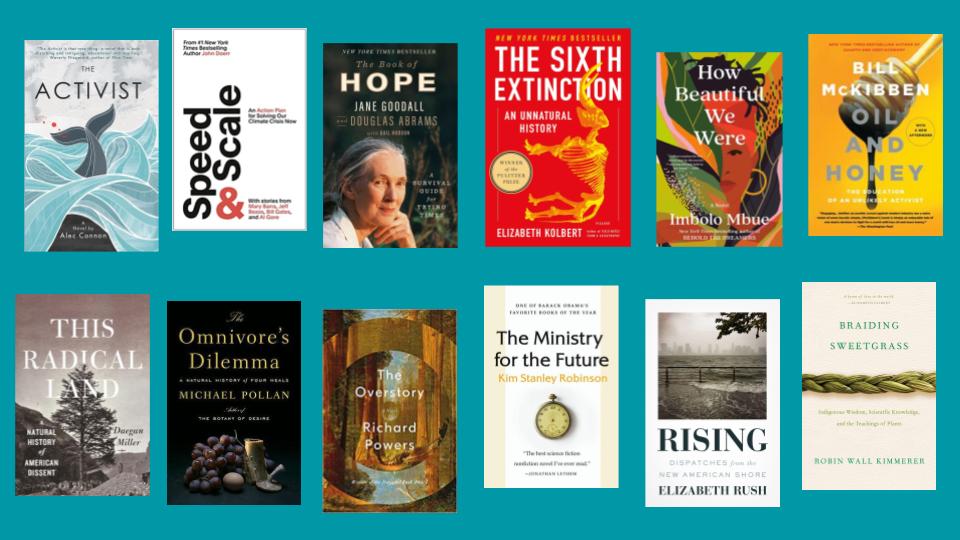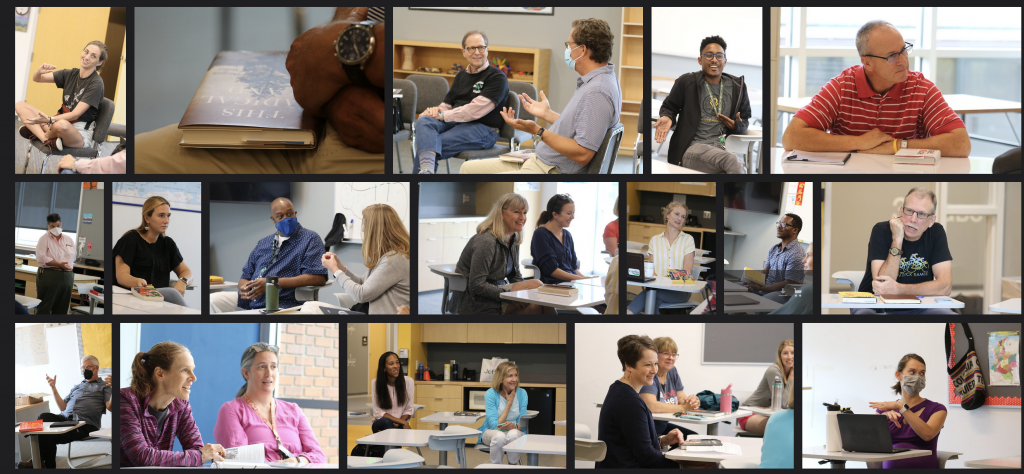
Each year, Durham Academy kicks off our return to school with discussions of summer reading. Most folks think that summer reading remains a student experience, working through an assigned text to be ready to discuss it in first week English classes, but faculty and staff do summer reading, too! Usually we pick a focus for our reading, choose from a series of texts and meet during the week of opening meetings to have book club-style conversations. And we have fun doing it.
To help kick off the 2022-23 sustainability focus for DA, our summer reading was all about climate change, land use, environmental activism, dietary choices, activism, and most importantly, hope. We hoped to do what we do best: look at sustainability from the perspective of education. How could we learn more?
Our choices represent a range of topics, viewpoints and genres, providing something for anyone and everyone. Curiosity drove individual selections, and while some texts were more popular than others (Jane Goodall, I see you…), each text drew at least a few interested readers.
DA Sustainability Summer Reading List:
The Activist: A Novel by Alec Connon (2016)
Speed & Scale: An Action Plan for Solving Our Climate Crisis Now by John Doerr (2021)
The Book of Hope by Jane Goodall (2021)
The Sixth Extinction: An Unnatural History by Elizabeth Kolbert (2015)
How Beautiful We Were: A Novel by Imbolo Mbue (2021)
Oil and Honey: The Education of an Unlikely Activist by Bill McKibben (2014)
This Radical Land: A Natural History of American Dissent by Daegan Miller (2018)
The Omnivore’s Dilemma: A Natural History of Four Meals by Michael Pollan (2006)
The Overstory: A Novel by Richard Powers (2018)
The Ministry for the Future: A Novel by Kim Stanley Robinson (2020)
I chose Robin Wall Kimmerer’s Braiding Sweetgrass and found a gentle meditation on the ways that scientific and indigenous ways of knowing combine to help us understand our community as one of humans, animals and plants, interconnected and interdependent. My discussion with fellow readers allowed us to share the ways that we have connected and disconnected from nature in our journeys and to wonder if indigenous ways of knowing are compatible with our consumerist culture.

Several faculty and staff members shared their experiences reading and discussing their text. Many made personal connections and others looked at ways to bring the learning directly to DA. US Dean of Students Tyrone Gould “enjoyed how Omnivore’s Dilemma balanced inviting readers to reconnect with the food industry while also challenging us to reflect on our relationship with the food we consume. Our group discussion brainstormed creative ways to both connect and promote local CSAs (Community-Supported Agriculture) with the DA community.” MS Assistant Director Gerty Ward shared that The Overstory “is often said to be speaking for the trees,” while Erika McCarthy pointed out the difficulty in connecting this perspective to DA’s sustainability goals because DA is in the business of children and none of the novel’s characters have children.
Other folks found personal connections to the stories and challenges presented in the texts. US World Languages Teacher Constanza de Radcliffe shared her group’s reactions to the novel How Beautiful We Were by Imbolo Mbue, a Cameroonian-American novelist, saying:
As a group, we realized the novel hit close to home. A very similar case happened in the 90’s in my home country, Colombia, where the U’wa indigenous community took up a foreign oil company in court in an attempt to save their ancestral land. Several of us were familiar with the oil and mining industries through past jobs or family connections. All of us reflected on our use of non-renewable fuel, or the electric alternative, which in its own way still presents environmental challenges. At the heart of Mbue’s writing and our discussion though, was the humanity of the affected community, and our own humanity.
Director of Marketing and Communications Leslie King shared the following about Rising:
I grew up in Miami and the Keys and spent most of my childhood in or around the ocean. When you grow up in a place where hurricanes are prevalent, you develop a deep appreciation of nature’s power and its ability to change lives and livelihoods at any moment. Hurricanes destroyed my junior high/high school and my grandparents’ home. I grew up in and go home to a place where development continues in spite of that threat and where the ocean and increased storm flooding are slowly destroying not just the coastline but entire neighborhoods. Global warming is changing where I grew up, forever. Rising was a fascinating look at the impact of this slow-motion crisis on communities across the country and I loved its journalistic lens on storytelling.
If you, too, love to read, miss your youthful summer reading experiences, want to learn more about sustainability or just want to read what the cool folks are reading, we invite you to join us. All you need to do is select a book from the list, read it, share your thoughts in comments on this blog and/or reach out to talk with some fellow readers.
Here are the questions we used as a starting point for reading, thinking and reflecting on the readings.
- What is your opinion on the book?
- What did you learn about sustainability from your chosen book? What new ideas or information did you glean?
- What was the author’s attitude towards the issues he/she/they addressed?
- How did the book make you feel about our progress (or lack thereof) on sustainability? Are you any more or less hopeful after reading?
- Is there anything you’ll do differently after reading the book?
- Did the author propose or reference any solutions to our current sustainability dilemmas?
- Are you curious about anything now that you’ve read this book? If so, how do you plan to carry that curiosity forward?
Please join us on our journey to a more sustainable future!
